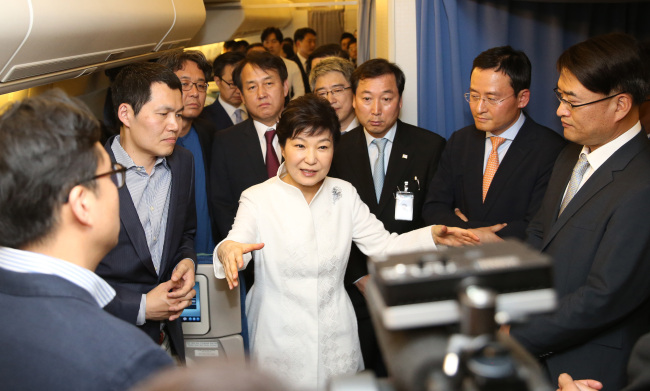您现在的位置是:半岛新闻网 > 行业动态
Trump is telling us how he’ll respond to future indictments.
半岛新闻网2024-09-23 07:27:31【行业动态】7人已围观
简介With Donald Trump facing multiplying criminal inquiries, he is resorting with even more desperation
With Donald Trump facing multiplying criminal inquiries, he is resorting with even more desperation to his favorite court maneuver—delay. That is what is happening in the criminal case brought against him by Manhattan District Attorney Alvin Bragg, stemming from hush money payments made during the 2016 presidential campaign. Trump is now arguing in court that the creation of phony personal documents to cover up those payments were official presidential acts, and therefore that the state case against him should be removed to federal court. This ploy must be rejected. The damage that extended and unmerited federal wrangling could do to the case would be consequential and, if successful, it could serve as a terrible model for similar delay efforts in later cases like the potential indictment he is facing in Fulton County, Georgia. The courts must send a clear message repudiating these tactics.
Ordinarily, state criminal charges are heard in state court and federal criminal charges are heard in federal court. But there are exceptions. Trump is purporting to invoke one such exception in this case: the federal officer removal statute. It provides that any “officer” of the United States may remove a state court criminal action against him to federal court, if the prosecution is “for or relating to any act under color of such office.” The Supreme Court has construed the statute also to require that the officer “raise a colorable defense arising out of their duty to enforce federal law”—that is, a defense based on federal law that is at least plausible.
AdvertisementThe removal statute reflects Congress’ recognition that federal law enforcement officers may sometimes be required to enforce federal laws and take other actions that are unpopular in local jurisdictions, and that they could face unjustified state charges in retaliation for doing their job. The very first version of a federal officer removal law was passed in 1815, in response to New England’s resistance to the War of 1812 and to the risk that federal officers charged with enforcing the trade embargo with England could meet with hostility in that pro-English part of the country.
Advertisement Advertisement AdvertisementPlainly, the New York case against Trump is not the kind of case that led Congress to pass the removal statute. In a court filing last week, Bragg argued that it does not satisfy anyof the statute’s requirements. He’s right. Most obviously, as the Supreme Court has explained, a federal officer’s actions are protected only when they are taken “under authority of federal law in the discharge of [the officer’s] duty and only by reason thereof.”
AdvertisementThis case does not remotely meet that standard. The hush-money payments to a woman with whom Trump was alleged to have had an affair, Stormy Daniels, were made in October 2016, before Trump was elected president. Those payments were made by Trump’s legal fixer, Michael Cohen, and Trump then used his own funds (or those of his business interests) to reimburse Cohen in 2017. The charges against Trump allege that he falsified his private business records in the course of making those reimbursements, in order to conceal the nature of and reasons for the payments.
Trump was serving as president by that time, but there is no basis for viewing his actions as taken in his official capacity. The charged conduct involved no assertion of federal authority and did not discharge any official responsibility. There is simply no connection between that conduct and Trump’s presidential duties.
AdvertisementRelated From Slate

Dennis Aftergut
Trump Blew an Enormous Hole in His Classified Documents Defense
Read MoreIn arguing otherwise, Trump has insisted that his payments to Cohen were made in his official capacity because he retained Cohen as his “personal lawyer” and he transitioned his business interests (whose records are at issue) into a pre-existing trust only because he was president. Even if true, those contentions cannot possibly support a conclusion that the charged conduct was taken in Trump’s official capacity. The role and responsibilities of the president are vast, but they are not without limit. As the Supreme Court has explained, there is an “outer perimeter” to the presidential role, beyond which the occupant of the presidency acts in a personal or “unofficial” capacity. And the very fact of Trump’s decision to retain Cohen as his personallawyer reflects that it falls on the unofficial side of the line.
Advertisement AdvertisementIf this were not the case, there would be no effective limit to the president’s role. If Trump’s claim that he retained Cohen and put his businesses into a trust only because he was president were enough to place those actions within his official role, then virtually every action taken by a president while in office, whether appropriate or inappropriate, would likely fall within that role. That would yield an unlimited conception of the presidency, which has no basis in law.
Advertisement AdvertisementIf Trump’s attempted removal is without merit, why bother? We can only speculate about his motives, but one possibility is that it is simply an attempt at delay. After all, an even more implausible effort to have a special master appointed in the Mar-a-Lago documents investigation temporarily succeeded, slowing it down for months before an appellate court finally intervened. In this case, although the New York state court may take steps to proceed with the case while Trump’s attempted removal is pending, he cannot be convicted until the removal is denied. And given the typical pace of federal litigation, that could take time. The closer we get to the 2024 election, the more Trump will argue that any movement in his case should be delayed until after the election. And if, as expected, Trump is indicted this summer in Fulton County, Georgia, for his alleged attempts to interfere with the administration of the 2020 presidential election in that state, he may try to use the same set of delay tactics there.
AdvertisementThis would not be the first time a litigant has pressed dubious legal arguments merely for purposes of delay. But it should not be allowed to happen. If for no other reason, voters participating in the 2024 election (and Republicans participating in the primary process before that) should be able to know whether Trump is guilty of the charged offenses before making their choice.
AdvertisementPopular in News & Politics
- A Supreme Court Justice Gave Us Alarming New Evidence That He’s Living in MAGA World
- Ten Years Ago, His Book about Civilizational Collapse Got Unexpectedly Popular. He’s Back With a Little Bit of Hope.
- We’ve Been Entertaining an Illusion About the Supreme Court. It’s Finally Been Shattered.
- Them Supreme Court Boys Are at It Again
That is still possible. The federal judge handling the New York removal, Alvin Hellerstein, has scheduled a hearing on the matter for the end of June. Given the weakness of Trump’s removal argument and the strength of Bragg’s opposition to it, the judge should not need much time to deny it and to order the case remanded to state court. Assuming Trump appeals, the court of appeals (and the Supreme Court if necessary) should set an accelerated schedule and adjudicate it on an expedited basis. It is possible for all of that to happen before the trial starts in March 2024, as currently planned.
Like any other criminal defendant, Trump is entitled to the presumption of innocence. He cannot be convicted at trial unless a jury unanimously concludes the prosecution has proven his guilt beyond a reasonable doubt. Those bedrock constitutional protections apply in state courts and federal courts alike, and Trump’s trial must uphold them. But it is a trial that should take place in New York state court, before a New York state judge and jury. And it should happen without delay.
Tweet Share Share Comment很赞哦!(34349)
相关文章
- Best smart home deals this week
- LA felt like home straight away: Bale
- People's Gmail accounts appear to be sending out spam
- Amazon filed patent for 'unmanned aerial vehicles' for delivery drones
- Where to pre
- 搞好法制宣传教育工作 保障经济社会稳定发展
- 买砂糖桔被调包再一称缺3两
- Apple wants India to relax rules that disturb its minimalist product design
- Newborns hit new low, but births to those unmarried reach record high: data
- Felix wins 19th world medal
热门文章
站长推荐

World’s first ‘meltdown

Rubbery electrolyte makes for longer

France survive Belgium scare to reach Euro quarters

购置税优惠降了 汽车以旧换新补贴涨了

Understanding Relational vs. Non

[News Focus] Park to spin Iran summit into political momentum

无证驾驶摩托车拘留七日

Quarantine cooperation with N.K. not subject to sanctions: presidential official